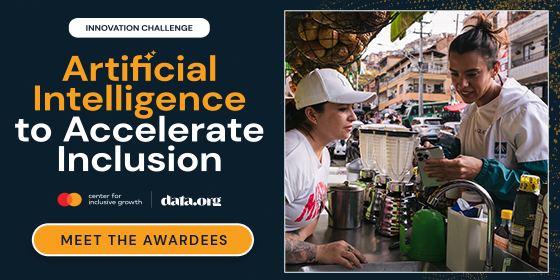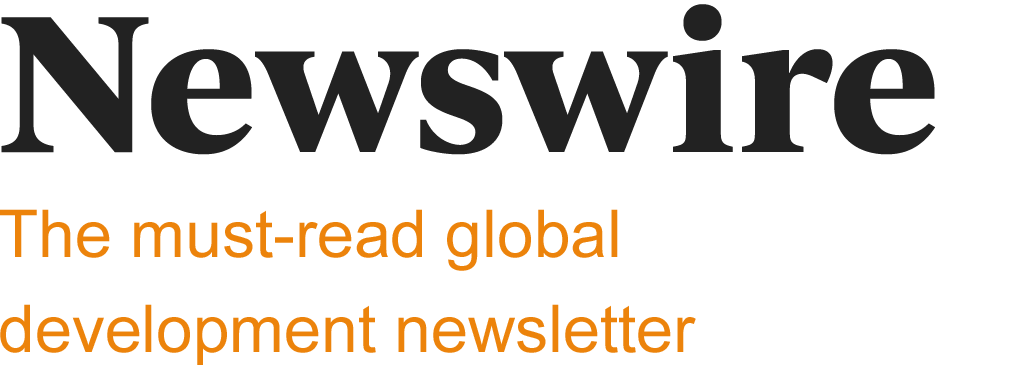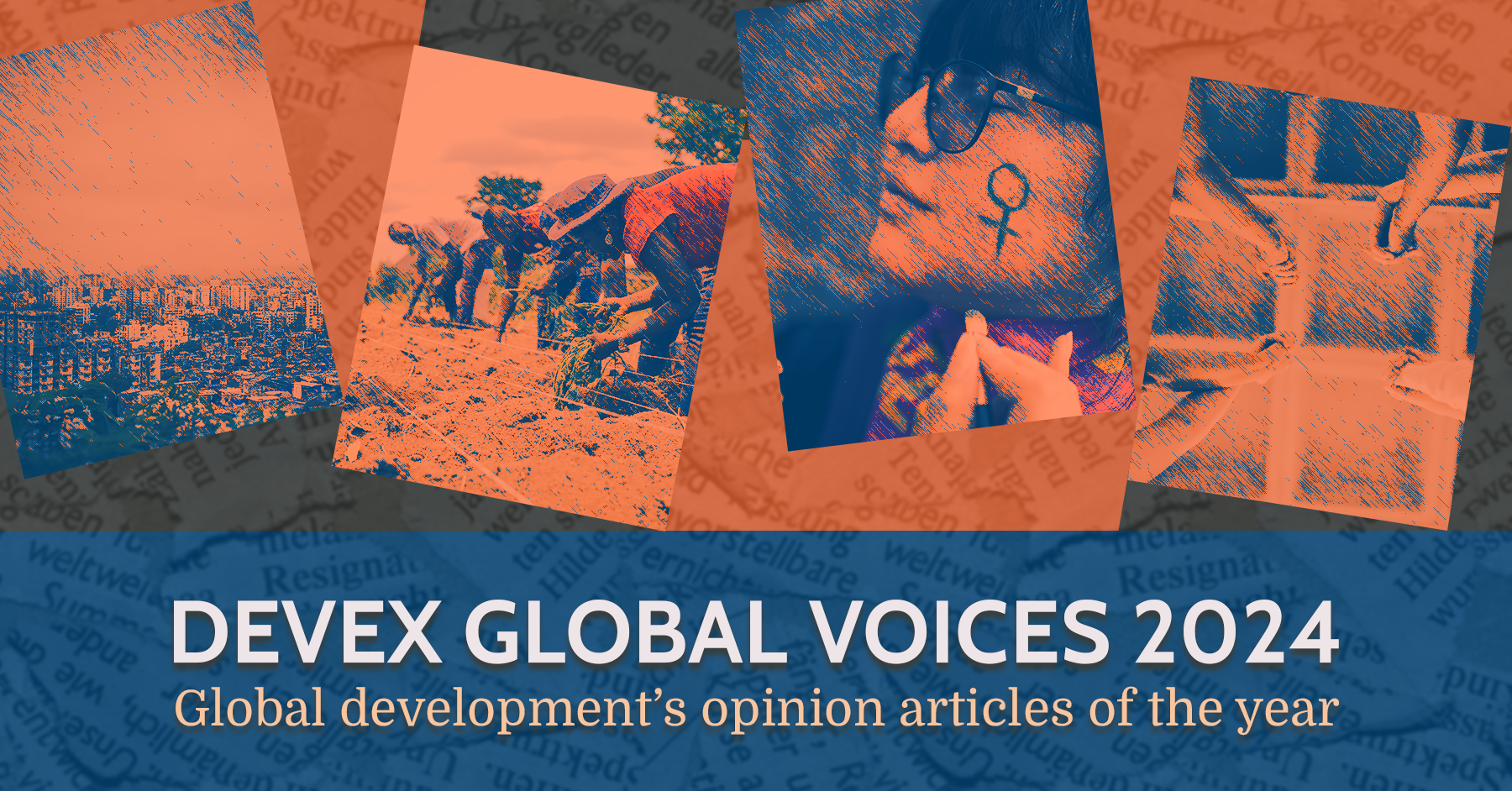|
Why are banks backing away from ESG standards?
|
|
|
|
U.S. small businesses — popular with both political parties — get a billion-dollar boost from America's foreign aid agency. Also in today’s edition: Are large businesses shying away from their global sustainability commitments — or boldly embracing them? 
|
|
Small but mighty
Democrats and Republicans have vastly diverging views on funding USAID — thanks, Captain Obvious! — but as we’ve been digging into for months, there are some areas of convergence between the two parties. Granted, it’s not much, but nowadays demoralized aid advocates are clinging to any life raft of hopeful news.
One common objective is the desire to shift more money and power to local organizations abroad. Another lands closer to home: the desire to shift resources to American small businesses — and for the first time in USAID’s history, the agency’s funding to those businesses reached more than $1 billion this past year. “This is the first time that we’ve crossed this threshold, and it is the largest number of dollars that we’ve ever obligated to U.S. small businesses,” said Kimberly Ball, director of the Office of Small and Disadvantaged Business Utilization at USAID, during a virtual business forecast call last week. Every year, USAID works with the U.S. Small Business Administration to set goals on working with such enterprises, through both prime and subcontracts, my colleague Elissa Miolene writes. That includes businesses owned by women, disabled veterans, economically disadvantaged individuals, and others. In 2024, the biggest increase came from contracts with businesses owned by disabled veterans, which Ball said more than doubled in cash terms. “Small businesses are popular on both sides of the aisle, so I don’t think the opportunities for small businesses are going away,” Ball said at the earlier event, hosted by the Professional Services Council. “I would love to see them increase, and we’ll do everything we can to make sure that that happens.” Read: Small businesses, new partners on the rise at USAID |
|
A MESSAGE FROM DATA.ORG
 AI for all: Meet leading innovators driving inclusive growth data.org’s global innovation challenges identify leading data and AI solutions for social impact. The AI2AI Challenge launched with the Mastercard Center for Inclusive Growth has identified transformative innovations driving economic empowerment for all. Meet the leaders whose AI solutions are shaping a more inclusive and equitable future. |
|
Unsustainable exodus?
Sticking to the U.S., in recent years businesses have faced a political backlash for embracing environmental, social, and governance, or ESG, standards. Is Goldman Sachs the latest victim on the environmental front?
The investment giant has pulled out of a U.N.-convened coalition of banks committed to reaching net-zero greenhouse gas emissions by 2025, raising concerns it’s another sign that U.S. financial institutions are ditching environmental sustainability commitments, my colleague Jesse Chase-Lubitz reports. The U.N. banking coalition is part of the Glasgow Financial Alliance for Net Zero, or GFANZ, whose member groups have seen many departures in recent years. The exodus coincides with growing hostility toward corporate ESG policies. In November, for example, 11 U.S. states filed lawsuits accusing banks of violating antitrust laws in their collective support for ESG and sustainability initiatives — based on the argument that by banding together on sustainability, the banks are restricting coal production and therefore raising prices for consumers. “This is emphatically not an isolated incident,” says Mindy Lubber, CEO and president of the sustainability nonprofit Ceres, of Goldman’s exit from the alliance. “We’re seeing substantial trends, at least in the United States, in that direction.” Others disagree that the exit is part of a larger trend; rather, it could be a backlash against bureaucratic reporting headaches, according to Patrick Odier, president of Swiss Sustainable Finance, which promotes sustainable finance in the banking sector, and chair of the recent Building Bridges Summit (more on that below). “The pity of this is not that these players will not play their role or want to reach the sustainability objective,” Odier tells Jesse. “The pity of it is that it gives the wrong signal to the industry and to the world about what finance is really willing to do.” Read: Are big banks backing away from climate commitments? |
|
Sustainable influx?
Despite the increasingly unfriendly terrain for ESG investing — in the U.S. at least — the numbers at the 2024 Building Bridges Summit and Action Days beg to differ that global sustainable finance is on the wane.
More than 3,000 participants from 97 countries registered for the four-day event in Geneva last week. Among the initiatives launched at the summit was CAPE: The Carbon Accelerator Programme for the Environment, which will support and scale African nature-based projects that address both climate change and biodiversity loss by making them investable. The first projects will be announced in April 2025. “We are committed to rebuilding a global financial architecture that restores the fabric of society and meets the demands of our new reality,” Odier wrote in the press release. “We need to be vocal and not shy away from speaking the truth about what is really necessary,” adds Karen Hitschke, CEO of the newly formed Building Bridges Foundation. “We can take action and we can be forceful.” |
|
SPONSORED BY ABT GLOBAL
The need for HIV integration in a post-2030 world
What does it take to integrate siloed HIV programming into wider primary health systems? Abt Global’s Lawrence Kahindi explains. |
|
Power up
While most of the development sector agrees climate change requires forceful action, there is some debate over whether institutions such as the World Bank should devote resources to cutting greenhouse gas emissions over more traditional development metrics such as health care.
As with most things in life, there are no easy answers, but at least one bank program is showing you can do both. The remote towns in Nagaland, one of India’s least populated states, constantly wrestle with extended power cuts both because of low electricity generation and extreme weather. That in turn forces patients and health workers at the 75-bed Kiphire district hospital to work amid blackouts that sometimes stretch six to seven hours, Devex contributing reporter Cheena Kapoor writes. “Our staff would work under emergency lights or ask patients to hold candles, while they administered medicines or injections,” says Dr. Holiba Anarm, who works at the hospital. So the state reached out to several global institutions for help. The result was the $60 million Nagaland Health Project, funded by the World Bank, which has equipped over 175 small and big health care centers with solar power panels that have cut dependency on fuel-run combustion generators, reducing their carbon footprint. “Conservative estimates suggest 250,000 additional deaths per year due to climate change between 2030 and 2050,” a World Bank spokesperson tells Cheena, identifying climate change as “the biggest global public health threat of the 21st century.” Read: How the World Bank is building climate-resilient health systems in India |
|
Global voices
Through Devex opinion pieces, development leaders in our community, from global health practitioners and food systems experts to development finance economists and humanitarian workers, share solutions-focused insights on what’s working — and what’s next.
In the 2024 edition of Global Voices, we spotlight predictions for the year ahead in key areas such as artificial intelligence, gender equality, and climate action. We also revisit some of this year’s most-read opinion pieces, offering expert takes on the pressing challenges and emerging opportunities shaping our world. Today we’re featuring some of our most-read op-eds on inclusive development:
|
|
SPONSORED ANNOUNCEMENT
Pathways to sustainability: Integration and the future of HIV progress
A sustainable HIV response depends on financing, policies, and local ownership. Integrating HIV services into primary care can expand access and strengthen health systems — though challenges remain. Devex and Abt Global are producing a report launching in 2025 on sustaining HIV progress through integrated approaches. To gain insights, Devex spoke to Abt Global’s Lawrence Kahindi on integrating siloed HIV programming in Namibia. Read the Q&A: The need for HIV integration in a post-2030 world |
|
In other news
The U.K. announced Sunday that it will provide £50 million in emergency aid for Syrians. [The Guardian] The United Nations has launched a renewed effort to help Libya hold long-delayed elections by pushing the country’s rival political groups to agree on a plan, as divisions and disagreements have kept the process stalled for years. [Reuters] Israeli air strikes have killed at least 35 Palestinians in Gaza, including those who were guarding trucks carrying humanitarian aid. [BBC] 
|
|
Thank you for reading today’s Newswire, edited by Fiona Zublin, copy edited by Nicole Tablizo, and produced by Yula Mediavillo and Mariane Samson. Have a news tip? Email [email protected].
Forwarded by a friend?
Sign up here to receive the Newswire directly.
|
|
Devex thanks our partners for supporting our newsletters.
Our editorial content remains independent. Interested in partnering with us? Get in touch. |
|
Connect with us:
|







